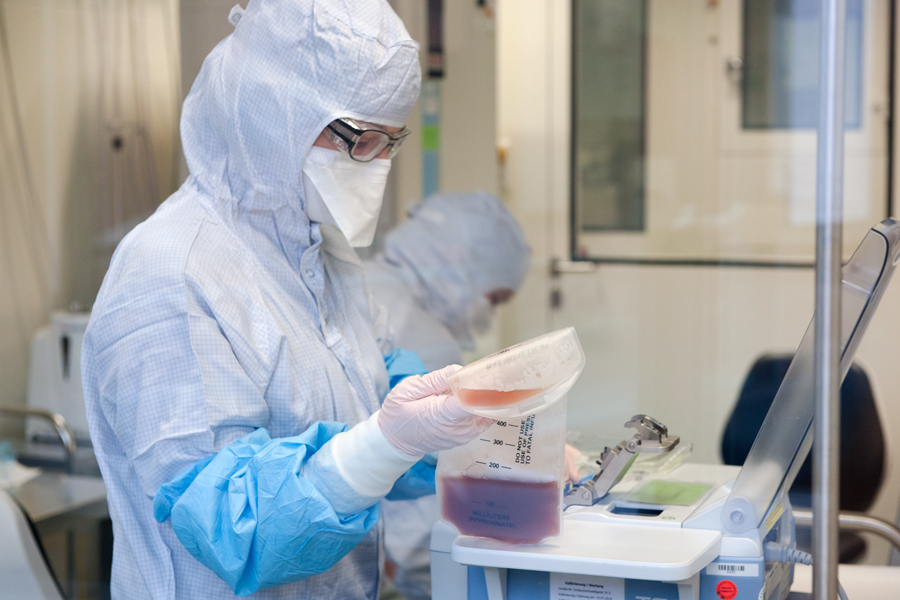Fraunhofer IZI and Novartis Continue Successful Collaboration with CAR-T Cell Therapy
Novartis and Fraunhofer IZI announced today that a further agreement has been concluded between Novartis and the Fraunhofer Institute for Cell Therapy and Immunology in Leipzig for the manufacture of the CAR (chimeric antigen receptor)-T cell therapy for patients in Europe over the next few years. The collaboration that began back in 2015 to manufacture CAR-T cell therapies for patients taking part in clinical trials initiated by Novartis is therefore being successfully expanded and continued.
Fraunhofer IZI is a key manufacturing and development site here for the cell therapy Kymriah® (CTL019) provided to patients in Europe taking part in respective clinical trials and Compassionate Use Programs.
On August 27, 2018, Novartis announced that the therapy had been approved by the European Commission (1). Over the next few years, prescription-only T-cell therapies will now also be manufactured on an interim basis in the Main Department of GMP Cell and Gene Therapy at Fraunhofer IZI, alongside investigational medicinal products.
At a joint press event, Novartis, Fraunhofer IZI and investigators from Frankfurt and Cologne university hospitals discussed the mode of action, the manufacturing process and their experiences so far from the clinical trials.
About the CAR-T cell therapy and Kymriah® 2,3,4,5
The CAR-T cell therapy is a new type of cancer immunotherapy. It uses T cells found in the patient’s body to fight certain types of cancer. In order to do this, the cells are extracted by leukapheresis and then genetically reprogrammed in vitro in such a way that they can use their chimeric antigen receptor to recognize cancer cells and other cells that have a specific antigen on their surface. Following lymphodepleting chemotherapy, the reprogrammed cells are fed back to the patient though an infusion. The cells then multiply and can trigger the immune response.
In August 2017, the first CAR (chimeric antigen receptor)-T cell therapy became available in the USA in the form of Kymriah® (CTL019/tisagenlecleucel). Kymriah® was granted FDA approval for children and young adults up to the age of 25 years who have acute lymphocytic B-cell leukemia that is therapy-refractory or has relapsed at least twice. Approval was subsequently granted in May 2018 for adult patients with relapsed or refractory diffuse large B-cell lymphoma (DLBCL) after two or more lines of systemic therapy. On August 27, 2018, Novartis announced that it had received approval from the European Medicines Agency for both of these indications. The therapy is an innovative one-time immunotherapy which uses the patient’s own genetically modified cells in the fight against cancer cells. CTL019 uses the 4-1BB costimulatory domain as part of the chimeric antigen receptor in order to increase the expansion and persistence of the cells.
- 1) Further information on the approval of Kymriah® can be found in the press releases published by Novartis on August 27, 2018 and August 31, 2018.
- 2) Abken H. CAR-T Zellen: Wie Designer-Immunzellen gegen den Krebs scharfgemacht werden können. Trillium Immunologie 2017; 1(1):43-47.
- 3) Tran E et al. A Milestone for CAR T Cells. New Engl J Med 2017. DOI: 10.1056/NEJMe1714680.
- 4) Information on Kymriah provided by the FDA. Available online at www.fda.gov
- 5) CAR T Cells in Trials: Recent Achievements and Challenges that Remain in the Production of Modified T Cells for Clinical Applications. Köhl U, Arsenieva S, Holzinger A, Abken H, Hum Gene Ther. 2018 May; 29(5):559-568

